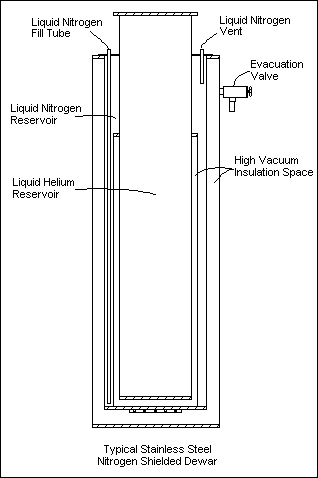
A high quality liquid helium dewar is necessary to minimize the heat flow into the liquid helium
and maintain a stable operating environment for the magnet. Dewars manufactured of both stainless
steel and aluminum are available. Stainless steel dewars are considered optimum in performance
and durability, while aluminum dewars represent a cost effective alternative to stainless steel
and an economical way to maintain the liquid helium environment.
Many liquid helium dewars utilize liquid nitrogen shielding to reduce the liquid helium consumption.
Liquid nitrogen shielding is recommended if the application requires repetitive warming and cooling
of the dewar or if helium consumption must be minimized. The vacuum jackets of the nitrogen and
helium reservoirs are typically connected by a common vacuum pumping port so that a quick vacuum
pump down can be achieved.
Vapor shielded dewars use multilayer superinsulation to reduce the radiation heat load of the helium
reservoir. The multilayer superinsulation is cooled by the venting helium gas. Vapor shielded dewars
operate best when experimental run times are prolonged. Enlarged helium reservoirs are a common
feature on vapor shielded dewars so that larger quantities of helium can be transferred to the dewar.

 Level Instrumentation
Level Instrumentation
 Magnet Power Supplies
Magnet Power Supplies
 Cryogenic Components
Cryogenic Components
 Dewars
Auto-Fill Systems
Current Leads
Dewars
Auto-Fill Systems
Current Leads
 Low Temperature Inserts
Warranty
Contract Manufacturing
Image Gallery
Low Temperature Inserts
Warranty
Contract Manufacturing
Image Gallery
